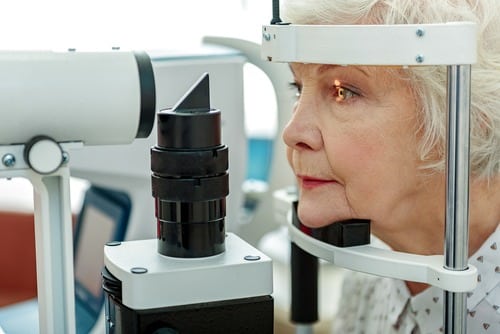Eyes are valuable and make one of the most important senses.
Being delicate organs, eyes require special attention and care. Whether it is about getting your eyes regularly examined or consuming the right fruits and vitamins, eye care can be diverse, and it should be a part of habits. In addition to this, a little discretion towards eye care and aging should be given to shielding it from possible disorders like cataracts and glaucoma.
Today, Jackson Davenport’s team will guide you through eye care basics and the effect of age on vision. Have a read to know crucial eye care details –
But When Should I Begin Caring for My Eye?
Eye Care is something that should be made a habit irrespective of age.
Visiting eyecare specialists in Summerville at regular intervals yields no harm but protects you from adversity.
Most individuals do not give eye care the importance it deserves in the early years because aging and adulthood are considered the only problem associated with eyes. However, vision problems begin at an early age, depending on environmental as well as hereditary factors. Early vision problems can be corrected by wearing prescription eyeglasses or making changes in the diet; however, bigger problems are often difficult to address. So, it is better to be cautious and start taking care of the eye from the beginning itself.
What Kind of Vision Problems Occur at Different Stages?
There is no definite guide to vision problems because it doesn’t fundamentally depend on age, yet it can be diversified based on commonality –
1. Vision Problems for Children
If we talk about babies under six weeks of age, their eyes are in the developing phase. However, they are still able to recognize their parents.
Proper care should start after 6 months of age when a child’s vision is equivalent to the adult’s. First, an eye-checkup is usually recommended after a baby reaches 6 months of age. This examination has nothing to do with lower vision but more with the eye’s health and objects’ recognition. For example, the child should be able to follow objects without putting a strain on the eye.
As the child’s age progresses, additional precautions should be ensured, including top brand Sunglasses to protect from UV rays. UV rays can cause deleterious effects on the vision, and they can cause premature vision problems. From this time forth, parents should make sure that their child regularly uses eyewear to eliminate such problems. Any noticeable change should be observed and consulted with an eye specialist.
Common eye problems associated with children under 12 years are –
- Myopia: Also known as short-sightedness, it usually begins at the age of 5 years. Children complaining of blurry blackboards in school demonstrate an instant sign of myopia, corrected with prescription glasses.
- Hyperopia: It is also known as far-sightedness. This is the condition in which a child complains of blurry objects, including pencils, pens, and copies. An uncorrected hyperopia condition can further lead to crossed eyes. It is also treated with prescription glasses.
- Conjunctivitis: It is not an eye disorder but an inflammation that causes redness to the eye. Conjunctivitis is caused by a bacteria or virus and can rapidly spread from one person to another. It can be treated with prescription drugs.
2. Vision Problems for Young Adults
A complete vision is developed at six months of age, but the eyes keep growing and developing until a child reaches 18. Myopia is one of the common vision problems observed at this age. This can be caused by varied reasons, including exposure to UV rays, over the eyeball development leading to lesser focal distance. If not treated in the early stage, it can get severe at puberty.
The common corrective method for myopia is prescription glasses or contact lenses. However, glasses are considered safer for children. Early examination and diagnosis are recommended. A regular visit to the eye doctor in Summerville, SC, should be ensured to measure the degree of correction.
Children should also take proper measures and do not put excessive strain on the eyes. Working on the computer for a longer duration and a poor diet can exacerbate the condition. Ensure that you take regular breaks from your computer screens, phones, and television and wear sunglasses to protect your eyes from UV rays.
Common problems associated with young adults up to 39 years of age include –
- Computer Vision Syndrome (CVS): It is caused by overusing computers and putting a strain on the eyes. It can be corrected by using protective glasses with special lenses.
- UV Exposure: Harmful exposure to UV light can cause blurry vision. It can be corrected by sunglasses or UV protective clear lenses.
3. Vision Problems for Older Adults
Older adults are the most prone to eye disorders due to the weakening of eye muscles, especially after 40 years. The most common condition observed at this stage is Presbyopia, in which a person cannot see closer things, including phones, and moves it further away to look clearly. A regular checkup should be ensured at such time, and the problem should be addressed immediately. Usually, multi-focal lenses are utilized to correct them.
Final Words
Eyes are an important part of our health and wellness. It is critical to pay attention to eye care to avoid issues like vision and blinding-eye diseases.
Proper care and preventive measures since early childhood will help maintain a healthy vision, but it will also protect the eye from the harmful effects of UV rays and age-related disorders. Usually, vision problems are neglected to a certain age. Vision impairment begins much earlier but often goes unnoticed. Make sure to eat right, including vitamins and minerals, and go for regular eye exams.
We at Jackson Davenport specialize in providing the best eye care services in Summerville, SC, and surrounding regions. We are backed up by a team of eye doctors and can help you with personalized eye care solutions. Whether you are looking for top-brand sunglasses, contact lenses, or prescription glasses, we can cater to your needs professionally. To get details, talk to our experts at 843-871-9750, or schedule an appointment now.

